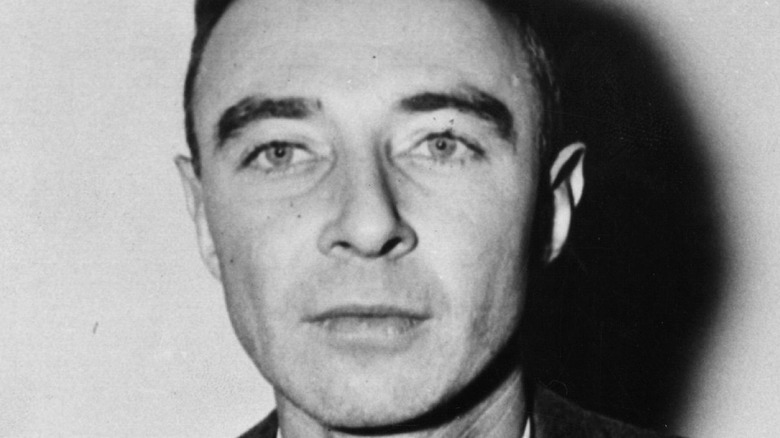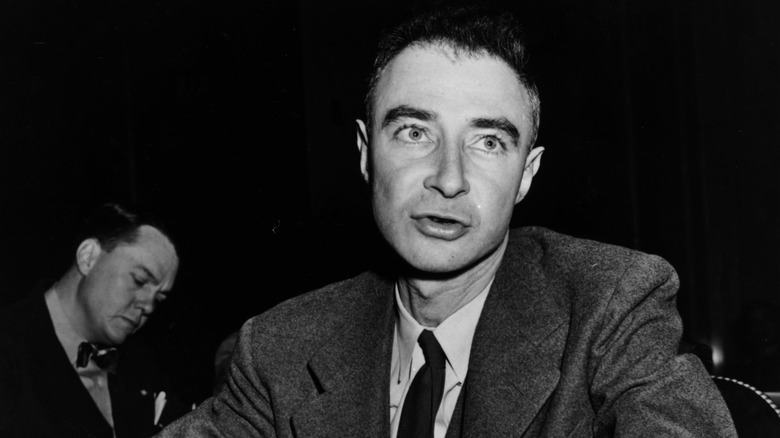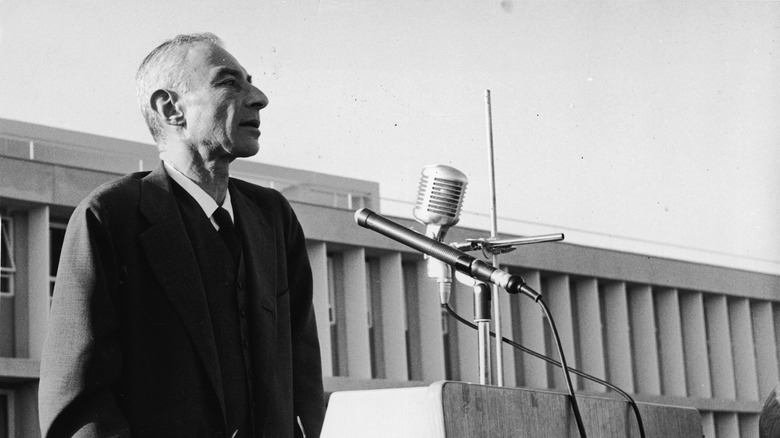The Story Behind A Famed J. Robert Oppenheimer Quote
Major moments in human history call for quotes that do the moment justice. Take, for instance, Neil Armstrong's words upon becoming the first human being to set foot on the moon: "That's one small step for man, one giant leap for mankind." Sure, he left out one small article that significantly changes the whole quote's meaning, and according to the Los Angeles Times, this haunted Armstrong for the rest of his life, because you don't get a do-over of being the first man on the moon. Still, it was still a pretty good quote, all things considered.
J. Robert Oppenheimer — widely considered to be the godfather of the atomic bomb, per Wired — is credited with a quote that captures the heaviness of the moment he first saw a nuclear warhead detonated during a test in the New Mexico desert. "Now I am become Death, the destroyer of worlds," Oppenheimer is credited with saying, a grim testament to the power of his creation that he had unleashed upon the world. What a lot of people don't realize is that this wasn't an example of in-the-moment wordsmithing on Oppenheimer's part. Rather, he was quoting a line from The Bhagavad-Gita, a Hindu scripture written in Sanskrit. Some have made the case that Oppenheimer's interpretation of one of The Bhagavad-Gita's most famous lines is thought to have been the byproduct of a slight mistranslation.
J. Robert Oppenheimer and Hinduism
Oppenheimer was a brilliant man. In addition to his scientific acumen, he was also known to speak an astounding eight languages and an interest in politics. He was also known to be fascinated by spirituality. Given the moral and ethical grey area of his work on the Manhattan Project, Oppenheimer turned to spirituality for guidance. Hinduism presented some of what he was looking for.
As far as his own religious views, Oppenheimer was born into a Jewish family. They didn't belong to a synagogue, but instead were interested in the Ethical Culture Society, which stemmed from Judaism but was a secular set of beliefs that championed fairly progressive causes like social justice, per NPR. Oppenheimer explored other faiths and belief systems and began seriously studying Sanskrit and reading the Gita in the early 1930s, according to The Economic Times.
Oppenheimer, however, never fully committed himself to Hinduism, per Wired, though he did find it valuable in making peace with — or at the very least, understanding — the philosophical ramifications of building the most powerful weapon the world had ever seen.
The Bhagavad-Gita
The Bhagavad-Gita is a 700-verse scripture that (according to Britannica) is itself part of the epic poem Mahabharata. In Sanskrit, Bhagavad-Gita translates to Song of God, and it's written in a dialogue format between two parties: Prince Arjuna and Krishnam, an incarnation of the Hindu god, Vishnu.
In the Bhagavad-Gita, Prince Arjuna is preparing for a battle with an army made up of some of his friends and relatives, which puts him in a bind morally. Krishna teaches Arjuna a philosophy that aims to separate his role as a warrior from his personal feelings and worries. According to Wired, this idea is one of the four primary lessons in the Bhagavad-Gita. It's known as dharma, which translate to holy duty.
It's pretty easy to see how this idea would appeal to Oppenheimer and why he seemed to know it forwards and backward. Like Prince Arjuna, Oppenheimer was looking for a reason to justify his work in the face of his own concerns. While Oppenheimer is best known for quoting verse 32.11 of the Bhagavad-Gita (or at least a version of it), he was known to quote from the Hindu scripture fairly often, even doing so at a memorial service for President Franklin D. Roosevelt, per The Economic Times.
Oppenheimer's famous quote
In a 1965 Interview (posted on YouTube), Oppenheimer himself described the moment he dropped one of history's most famous — and darkest — quotes in the moments after the first nuclear weapon test. "We knew the world would not be the same," he said. "A few people laughed, a few people cried. Most people were silent. I remembered the line from the Hindu scripture, the Bhagavad Gita; Vishnu is trying to persuade the prince that he should do his duty and, to impress him, takes on his multi-armed form and says, 'Now I am become Death, the destroyer of worlds.'"
According to Wired, this translation of the original Sanskrit verse uses the word "death" to mean "world-destroying time," which is a common way of interpreting Krishna's line. Rev. Dr. Stephen Thompson told Wired that essentially, Krishna is calming Prince Arjun's fears about having to potentially kill friends and relatives in battle by telling him that the decision isn't up to him. "Arjuna is a soldier, he has a duty to fight. Krishna, not Arjuna, will determine who lives and who dies," Thompson said.
While Oppenheimer turned to this philosophy to help him through a difficult moral dilemma, the likes of which few people ever face, in the years that followed it seemed that he still faced a struggle. According to WNYC, Oppenheimer said that, "In some sort of crude sense, which no vulgarity, no humor, no overstatements can quite extinguish, the physicists have known sin; and this is a knowledge which they cannot lose."



